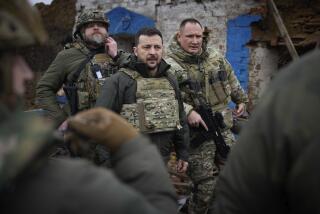Yeltsin Seizes Media, Slashes Aide’s Powers : Kremlin: Russian president swiftly commandeers Gorbachev’s office, sending ex-Soviet leader elsewhere.
- Share via
MOSCOW — Russian Federation President Boris N. Yeltsin, putting some final touches on the post-Soviet order, took over state radio and television Friday, slashed the powers of his vice president and commandeered Mikhail S. Gorbachev’s Kremlin office with such speed that the former Soviet leader had to go someplace else to work.
But even as Yeltsin solidified his rule, there were signs of alarming fissures in the new Commonwealth of Independent States. Its acting military commander, Air Marshal Yevgeny I. Shaposhnikov, told reporters that a two-day meeting of defense chiefs from the 11 member states failed to resolve all disagreements over defense policy.
By presidential decree, Yeltsin ordered the takeover of Gosteleradio, the state-run Soviet broadcasting company, and its renaming to “Ostankino” company, after the Moscow site where it has its main studios and broadcast tower.
Yegor Yakovlev, one of the earliest proponents of journalistic openness while editor in chief of the crusading Moscow News, will stay on as chief of television and radio. Under Yeltsin’s decree, the company is to broadcast news from Russia and the commonwealth.
As the evening news on Russia’s own previously existing channel noted, Yeltsin, who had spoken numerous times in favor of viewer choice, has now given Russia two different TV channels. But both are owned and financed by its government.
While the leader of Soviet radical forces, Yeltsin was the target of a virtual smear campaign by Gosteleradio. He then was practically banned from its airwaves in an attempt to stem his increasing popularity.
According to the Izvestia newspaper, the Russian leader, now the undisputed No. 1 figure in the Kremlin, moved into Gorbachev’s suite of offices Friday morning, to the great displeasure of the former Soviet president’s aides. They thought that their boss, who resigned on Wednesday, was to be given more time to wind up his affairs.
In fact, when Gorbachev showed up in the Kremlin later Friday, he found Yeltsin already behind his desk. With no visible signs of embarrassment or complaints, Gorbachev went down a floor to the office of Grigory Revenko, who had been his chief of staff, to go about his business, Izvestia said.
Gorbachev’s spokesman, Alexander A. Likhotal, said the former Soviet president plans to ring in the New Year in Moscow, then to take two or three weeks vacation in his native Stavropol region of southern Russia, where his mother, Maria, still lives in the rural village where he was born. Gorbachev, 60, will then return to Moscow to organize the work of an international think tank that he created after the August putsch , Likhotal said.
Once out of office, Gorbachev, who once had all the resources of a superpower at his beck and call, will have to get used to a more modest living standard. Under a deal worked out with Yeltsin and leaders of the other commonwealth republics, he has been allotted a three-room apartment on Kosygin Street in Moscow’s Lenin Hills, in lieu of the six-roomer he had before. He will be allowed to keep the dacha , or country cottage, outside Moscow that he had already been using.
In Moscow, defense ministers preparing for a key Monday summit meeting of commonwealth leaders in Minsk ended their negotiations to devise a common defense policy for the new community, with Shaposhnikov acknowledging that the earlier goal of a “single armed forces” was now unfeasible.
Consequently, participants in the meeting thrashed out the creation of a “united armed forces,” but even that concept did not satisfy Ukraine, Moldova and Azerbaijan, Shaposhnikov told reporters after the meeting ended.
He said he hopes that the remaining differences can be sorted out in Minsk. The ministers did manage to adopt documents, including an agreement on defense for the commonwealth states, to be submitted to the Minsk summit. But Shaposhnikov said some ministers added their own provisos.
One of the major disputes in the field of defense and strategy has been between Russia and Ukraine, which fears Russia’s dominance. A military spokesman confirmed that Shaposhnikov had urgently flown to Kiev along with the admiral of the Black Sea fleet Thursday to talk to Ukrainian officials, including Defense Minister Konstantin Morozov.
In particular, Defense Ministry spokesman Maj. Alexander M. Kluban said, Moscow-based officials and the Ukrainians have been talking about how to carve up the Black Sea fleet.
Officials from the Moscow ministry have said the Ukrainians now oppose the idea of creating two separate fleets in the Black Sea and object, in particular, to the transfer this week of the aircraft carrier Admiral Kuznetsov from the Crimean port of Sevastopol to Murmansk in northern Russia.
Russian-Ukrainian tensions have also broken out on the economic front.
Ukraine, which lacks an adequate supply of Russian-printed rubles, wants more currency shipped to the republic, anticipating that the liberalization of prices on Jan. 2 will make demand for the money zoom. Failing that, Ukraine wants Russia to postpone its price liberalization program, which is expected to send costs skyrocketing.
But Russia reportedly refused both requests. Ukraine’s response has been to move to implement a coupon system that, while formally maintaining the ruble as currency, would require consumers to use special coupons, instead of rubles, to pay for goods most in demand.
As he acts to build up the structures of Russian state power, one of Yeltsin’s decisions, a decree forming a single ministry to handle both police and security affairs, was strenuously opposed by Russia’s legislature. Its members recalled how the NKVD and other super police agencies from the Soviet past had led to terrible abuses of power.
In what will provide a litmus test of the ability of Yeltsin and the lawmakers to work together following the demise of centralized power, the legislature voted to request that the Russian president annul his decree.
Yeltsin on Friday night also moved decisively to deal with one of his most unexpected critics, Russian Federation Vice President Alexander V. Rutskoi, by stripping him of his control over five state committees. The Afghanistan war hero has been increasingly vocal in denouncing what he calls the intrigue and incompetence of Yeltsin’s entourage and has openly criticized the Russian leader’s plan for freeing up prices, which is expected to result in a drastic loss of buying power for most of the population.
With the vanishing of the Soviet empire, the last soldiers of the now-dissolved Soviet Interior Ministry, which had tried unsuccessfully to keep the peace in the disputed Nagorno-Karabakh region of Azerbaijan, were pulling out on Friday. That made residents worry about the likelihood of future bloodshed and hunger.
Each inhabitant of the mostly Armenian enclave will receive half a kilogram, or little more than a pound, of grain this month. That’s because the region has run out of flour and the largest grain storage depot is now in the hands of Azerbaijani guerrillas, the Tass news agency said. Legislative elections are scheduled today in the region, which wants to break away from Azerbaijan.
In other developments, Valery I. Boldin, Gorbachev’s 56-year-old former chief of staff, was released from jail because of deteriorating health so he can seek treatment in a hospital of his own choosing. He is charged with being one of the key figures in the August plot to overthrow Gorbachev.
More to Read
Sign up for Essential California
The most important California stories and recommendations in your inbox every morning.
You may occasionally receive promotional content from the Los Angeles Times.










